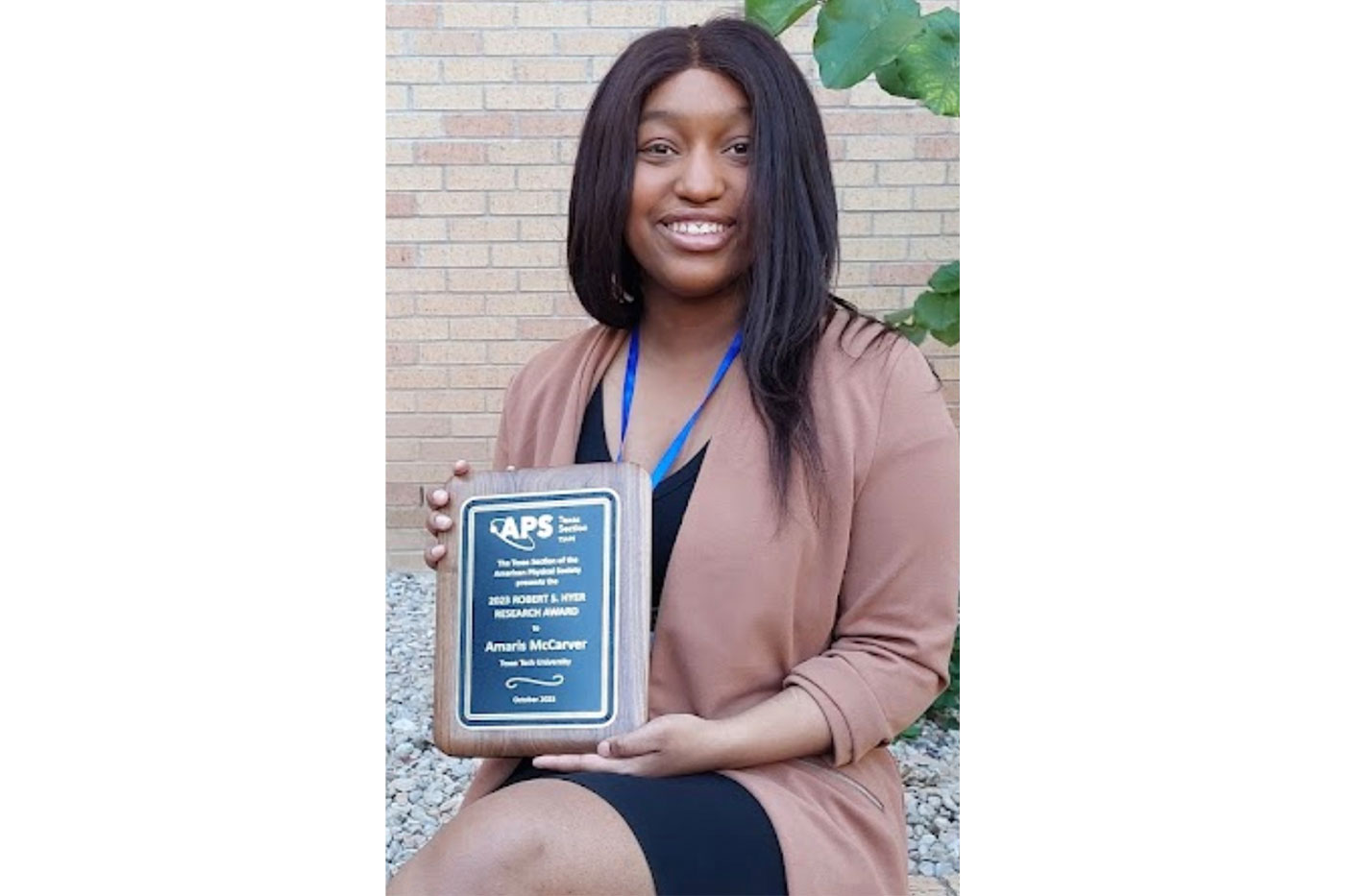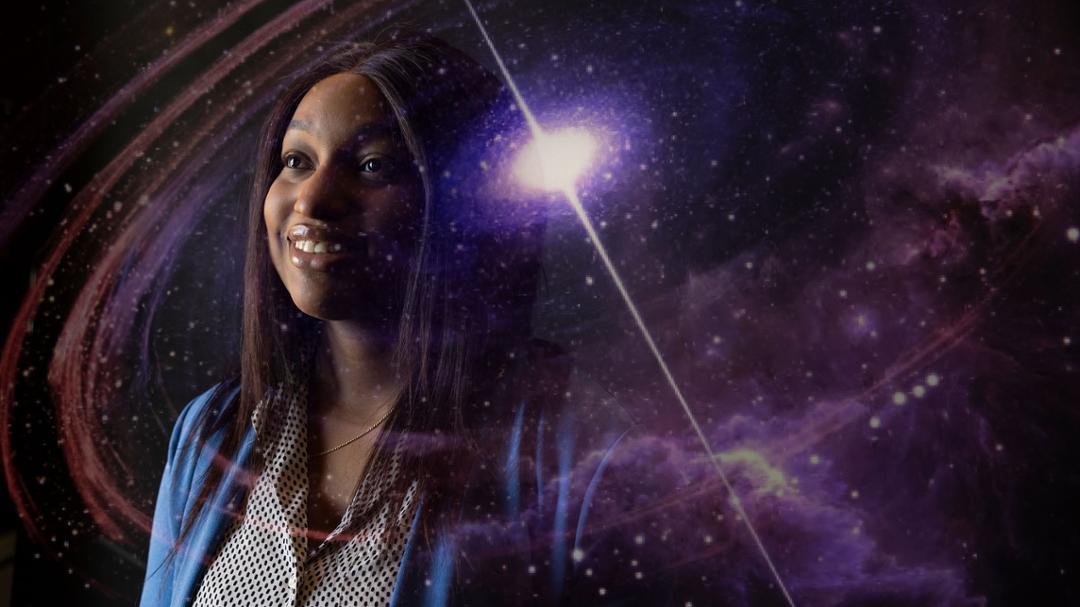Texas Tech student Amaris McCarver received a prestigious award for her work in discovering a pulsar within a cluster of stars.
She is so quiet, it’s difficult to hear her over the harsh and discordant sounds of a busy Student Union Building, but this is part of who Amaris McCarver is – a deep thinker who measures words carefully before employing them in conversation.
Beneath the veneer of pleasant dialogue and small talk, though, beats the heart of a relentlessly curious researcher, a fourth-year student in Texas Tech University’s Department of Physics and Astronomy. McCarver began wondering about the majesty and mystery of the world around her as a little girl and has never wavered in her quest to uncover new knowledge.
“As cliché as it sounds, I knew that I always liked science,” McCarver said. “My mom was a social worker, and when I was younger, she told me to pick a lucrative career, stay in school and focus on school.
“I liked science and thought becoming a scientist was my best option, but it wasn’t until I was in high school that I knew I wanted to be an astronomer. As soon as I learned about black holes and pulsars, I knew that is what I wanted to study.”
Her choice has been affirmed in a number of ways the past several years, but the most significant stamp of approval arrived earlier this semester when she was presented with the Robert S. Hyer Research Award by the Texas Section of the American Physical Society. The prestigious honor recognizes research excellence by an undergraduate student.

“It is very nice to see our own Amaris McCarver receive this award, which is given to only one winner each year,” said Sung-Won Lee, the physics and astronomy department chair. “Amaris is an outstanding undergraduate student and is very active in research. She is among the top physics undergraduates in Texas and would be competitive at the national level as well.”
Through her research, McCarver discovered a pulsar in a group of stars, known as a globular cluster, the first one ever detected in that specific cluster. Globular clusters are large spherical groups of gravitationally bound stars. It marked the culmination of three years of work with the U.S. Naval Research Lab, where she analyzed data and identified pulsar candidates before eventually confirming one.
“Amaris has made a major discovery,” said Tom Maccarone, a member of the physics and astronomy faculty who worked with McCarver on her research. “Since arriving at Texas Tech, she has shown truly exceptional independence as a researcher, developing her own scientific questions. The project for which she won the Hyer Award is exciting because it is not only an interesting discovery of a pulsar in an unusual star cluster, but it is also a validation of a method for finding much larger numbers of pulsars.”
Pulsars are rotating neutron stars that emit beams of electromagnetic radiation from their poles. Specifically, McCarver was looking for radio pulsars that emit radio waves as they rotate. These periodic signals eventually can be detected on earth.
“Ms. McCarver began working with my research group during the summer of 2021 at the height of COVID,” recalled Tracy Clarke, research astronomer in the remote sensing division at the Naval Research Lab. “Because of restrictions we ran the program remotely for the first time. I was concerned an undergraduate would find it very difficult to pursue fulfilling research under these conditions, but I could not have been more wrong.”
Clarke explained that McCarver’s repertoire of skills repeatedly amazed the team as she researched literature, identified targets and began searching through the lab’s expansive image archive. Along the way, she taught herself and the group how to more effectively use some of the available tools.
McCarver is from the Houston area. She decided to attend Texas Tech in part because she has an uncle who is a professor at the Texas Tech University Health Sciences Center and thought it would be nice to attend college at a place where a family member would be near.
She asked Maccarone if she could work with him, and he agreed. Before she had even begun her freshman year, McCarver was conducting research on black holes.
But it hasn’t always been easy. As rewarding as the research has been and fantastic as the recognition is, there is more to discover on a college campus besides academic pursuits.
“When I first came to Texas Tech, everyone would ask what my major was, and I would explain that I was a physics major,” she remembered. “I would get comments like, ‘You don’t look like a physics major.’ My question was what does one look like? Little things like that always reminded me that I am a minority in STEM (science, technology, engineering and mathematics).”
While the comments were few, they inspired her to continue being a trailblazer and someone others can look up to and follow.
“Throughout my journey, it’s been difficult not having people who have the same background as I do represented in my classmates, professors or anything like that,” she said. “I definitely look forward to becoming someone people who look like me can look up to. It is also one reason I am thankful for the instruction and insights of my mentors through the years.”
McCarver already is planning for the next chapter of her academic life, applying to graduate schools and looking forward to that day when she achieves her dream of becoming a professor at a research university and continuing to study pulsars.
“Amaris is an ideal student to work with,” said Emil Polisensky, a research physicist at the Naval Laboratory. “She works independently, trying to understand and solve problems on her own before seeking help from more seasoned researchers. She has mastered the astronomy software employed for data analysis in ways I didn’t know were possible. Best of all, she shared her expertise and taught it to me, paving the way for new research prospects for my other students.”
Ultimately, the path traveled by McCarver has been well worth it because she keeps her eyes on the prize – doing research and savoring the thrill of discovery.
“I genuinely enjoy my research,” she said. “Throughout the process there have been difficult moments and things I had trouble learning, but I just really enjoyed the research a lot. When I would struggle with a hard class, I got through it by thinking, ‘When I get through with this homework, I can do my research.’ Receiving this award has shown me how valuable my efforts have been.”

